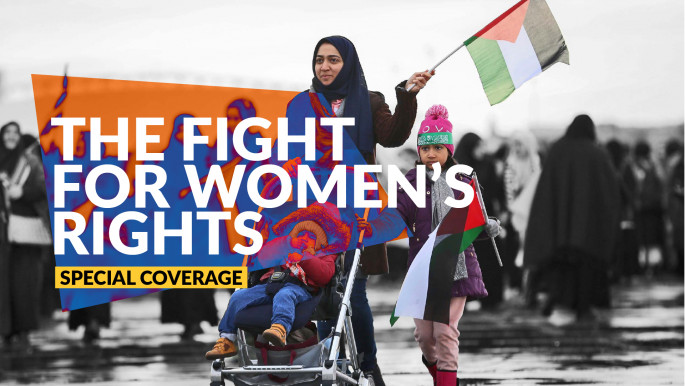New Arab feminism: Consciousness, art and action
New Arab feminism: Consciousness, art and action
Feminism today is shaping its way across horizontal channels, conveying multiple messages to a larger and more diverse audience.
5 min read
Feminism has now, more than ever, become a plural concept
Today's new wave of Arab feminism has proven that the liberating struggles of Egyptian Nawal el-Saadawi, Moroccan Fatima Mernissi, Lebanese Joumana Haddad, and Saudi Manal al-Sharif have had their ripple effects on the female millennial generation.
We have seen many of them walking the streets during the 2011 Arab Uprising, defending gender equality and equal rights as a non-negotiable condition to establish real long-lasting democracies in the Middle East and North Africa.
Feminism has now, more than ever, become a plural concept, embodying the opinions, perspectives, and voices on a wide spectrum.
In Saudi Arabia, many feminists have paid and are still paying a high price for such stand. In May this year, Loujain al-Hathloul was arrested by security officers in her car as she was driving near her university in Abu Dhabi. She was forced onto a plane back to her homeland and spent several days in prison.
Far from the street claims, academic papers, and books, feminism today is shaping its way across horizontal channels, that conveys its multiple messages to a larger and more diverse audience; in opposition to the once homogenic well educated and high social class audiences.
Of course, social media is partially where this new reclaiming of Arab feminism is taking place. However, new feminisms are sharing deep self-empowering and artistic messages that puts them in the centre of their own agency.
 |
In Saudi Arabia, many feminists have paid and are still paying a high price for such stand |  |
The empowered mind among young women
 |
|
| Read The New Arab's Special Coverage: The fight for women's rights in the Middle East |
Patriarchal oppressive tools have long prevented women of their power think, hence stripping them of their own power to change their circumstances. A higher focus has been placed on creating a freer internal world and a sense of self-responsibility.
"I firmly believe that the first step to a positive societal change would be to freely start thinking about and questioning our role, impact and actions in our societies: Why do I do what I do, or think what I think, feel what I feel? Hence, to me, at least, 'independence' begins in our minds," says Sana Afouaiz, a feminist and the Founder of Womenpreneur, a social enterprise empowering women to build their own company.
"It begins in the images that are created by our minds; in the mindsets that drive our individual and societal actions and behaviours," she adds.
"It begins in the images that are created by our minds; in the mindsets that drive our individual and societal actions and behaviours," she adds.
Much of that consciousness began by deconstructing the very ground for gender construction to shit the power balance towards a fairer more inclusive dynamic.
"The mental and psychological ideal any healthy society should aim for is that the apparent physical gender differences cannot provide the basis for conceptions of power and subjections," says Sana.
Beyond the discourse, there has been a more individual grassroots awareness. Feminism is in the air and enters the realm of grand personal questioning.
"Feminism did not start as a conscious thing. It took a long process for me to start admitting that I am one. I could not live my everyday life without being bothered with the political, economic, and social inequalities among men and women," says Dima Abdu, a Palestinian from Haifa.
Much of these thoughts have rapidly transformed into behaviours.
"In my everyday life, feminism has taught me this important lesson: to be myself, to wear whatever I want because I feel good in it. I stand up for my parents whenever my brother gets away with wrongdoings because he is a male," says Dima.
Much of the consciousness has grown onto the power dynamics in itself; away from hardcore feminism.
"What I hate about not being a feminist is the pressure put on men because of the financial responsibility imposed to them in our cultures. Men are still expected to pay when they date and when they marry, leaving marrying at an older age," says Racha Haffar Arensdorf, a Tunisian-Syrian social entrepreneur.
Much efforts are focused on shifting the balance of power.
"Why wouldn't they just work together and build together? Both men and women should take equal responsibility. That is not fair for men and takes the agency away from women," explains Racha.
Channelling through art
Art Forms have become the main arena helping to empower mindsets, seeking to deconstruct old deep-rooted beliefs and power structures.
"Dance, drawing, singing, but also graphic design has been changing the patriarchal perspective in such a way that is seen as a threat to misogynist group and even to political Islam," says Dareen Hassan, a Syrian filmmaker and founder of Nasawiya, an organisation that introduces art forms to the service of women's cause.
More recently, Moroccan illustrator Zainab Fasiki published her first comic Hshouma, which portrays women in their daily lives, with anecdotes leading to wider discussions of women's rights. Such forms of alternative arts have yet to push forward into the mainstream.
"Yet, one of our biggest obstacles remain mainstream commercial art in the Arab World. Video clips showcasing women who underwent heavy beauty surgeries with submissive behaviours to men are not helping our cause at all. The clips and their lyrics confine women solely to be a wife and a mother without any other aspiration or ambition," Dareen adds.



